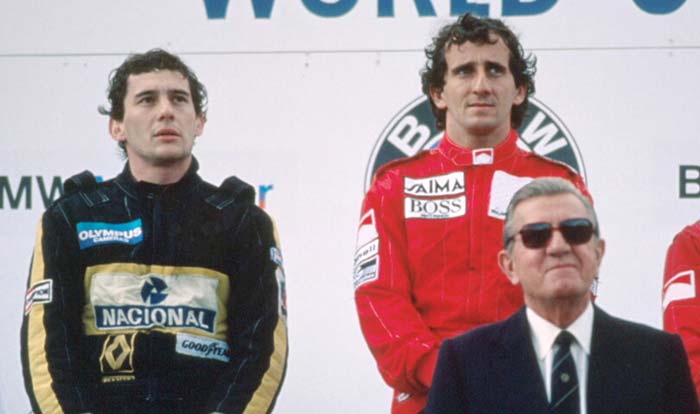As two new TV shows come out about the 80s F1 greats, what keeps Senna and Prost so key to the sport’s mythology? ADVERTISEMENT Max Verstappen wrapped up this year’s Formula One season with an impressively fought drive to his fourth world title last weekend. But as the world’s top level of motorsport returns to […]

As two new TV shows come out about the 80s F1 greats, what keeps Senna and Prost so key to the sport’s mythology?
Max Verstappen wrapped up this year’s Formula One season with an impressively fought drive to his fourth world title last weekend. But as the world’s top level of motorsport returns to the paddock, fans suffering from withdrawal symptoms are still amply catered for thanks to two new shows about F1’s greatest rivalry.
That rivalry isn’t the clash of titans seen when Verstappen went down to the final race with the sport’s most decorated star, Lewis Hamilton, in 2021’s controversial season. The two new shows focus on icons of the 80s, Ayrton Senna and Alain Prost.
Released on Netflix last month, ‘Senna’ is a six-part drama miniseries chronicling the life of the Brazilian three-time world champion, up to his fatal crash in 1994. It stars Gabriel Leone in the title role and has been met with a muted critical response to the drama alongside praise for its racing sequences.
Over on French TV channel Canal+, out now is a new documentary on the life of French four-time world champion and Senna’s rival, Alain Prost. Also told across six parts, ‘Prost’ is a more insightful piece that uses archive footage and contemporary interviews to tell Prost’s side of the story.
Dramatically retelling Senna’s story hasn’t been the victory lap that Netflix had hoped for, but the Prost documentary has largely been well received. Senna’s story was tackled best in Asif Kapadia’s 2010 documentary Senna.
Netflix likely commissioned the fictional drama ‘Senna’ on the back of F1’s increased popularity over the past few years. There are multiple reasons for the sport – previously associated with anoraks – coming back into popularity. After years of dominance by Hamilton, Verstappen and other new young stars rejuvenated the field while Liberty Media’s acquisition of the sport in 2017 refreshed the marketing approach.
Most significant of all was Netflix’s own docu-drama. The now annually released ‘Drive to Survive’ show was first released in 2019 and followed the drivers across a season, bringing the complex internal narratives of the sport to a layman audience.
If Netflix had a big helping hand in bringing F1 back into relevance, it’s interesting to note why the story of two of its stars from over 30 years ago are still at the forefront of their marketing push.
Senna and Prost competed against each other in F1 across the 80s, with Prost retiring from the sport in 1993 and Senna dying in 1994. The pair won a total seven out of nine titles in the period 85-93.
Both drivers were record breakers at the time, but in the decades since, drivers like Hamilton and Michael Schumacher have surpassed their achievements. Yet the Senna-Prost rivalry remains one of the most notable chapters in the sport’s long history.
It comes down to more than statistics. Senna and Prost encapsulated exactly what Netflix works tirelessly to do with each season of ‘Drive to Survive’. While Netflix’s documentary crew furiously edit the show to knit together a narrative of gladiatorial men with distinctive personalities fighting out career-long rivalries in death-defying races, Senna and Prost were the real deal.
Senna was the vivacious and emotional young Brazilian, prone to spiritual comments on the philosophy of life, love and racing. By comparison, Prost was nicknamed “the Professor” for his clear-headed approach to winning championships. If Senna couldn’t win, he’d rather crash out trying while Prost would rack up the points for a calculated total at the end of the season.
Their rivalry reached its peak in 1988-1989 when they both raced for the same team. At McLaren, the pair dominated the two seasons spent together, but each ended with controversy. With neither willing to concede to the other, both seasons ended with crashes between their cars determining the final result, Senna taking 1988 and Prost taking 1989’s championships.
Their time in F1 ended equally according to type. Prost, eminently seen as the sensible side of the equation, bowed out at the top of his game after winning his fourth title in 1993. Senna, pushing to the end, met his tragic fate at the 1994 San Marino Grand Prix.
The new Netflix show and Kapadia’s documentary do a lot to dramatise the rivalry between the two drivers. The Canal+ documentary takes a more sober approach to the pair, seeing Prost for his mercurial qualities and their mutual respect, even amid years of competing at the top level of their sport.
Even so, the attraction of the real-life story of two titans battling out over a sport when the stakes were literally life or death has remained far too magnetic for fans of F1 and beyond. Until Verstappen and the next cohort of drivers can find a way to inject a similar level of drama, expect F1 fans to continue to celebrate the legacies of Prost and Senna for many years more.














